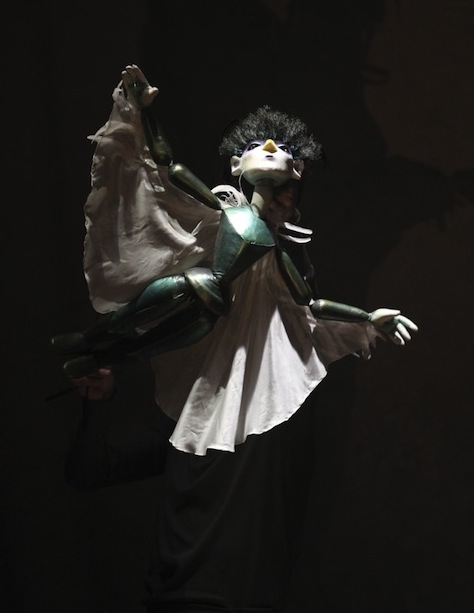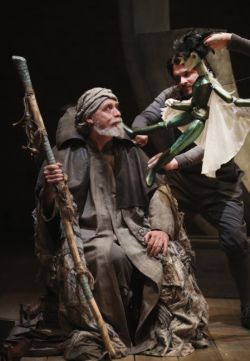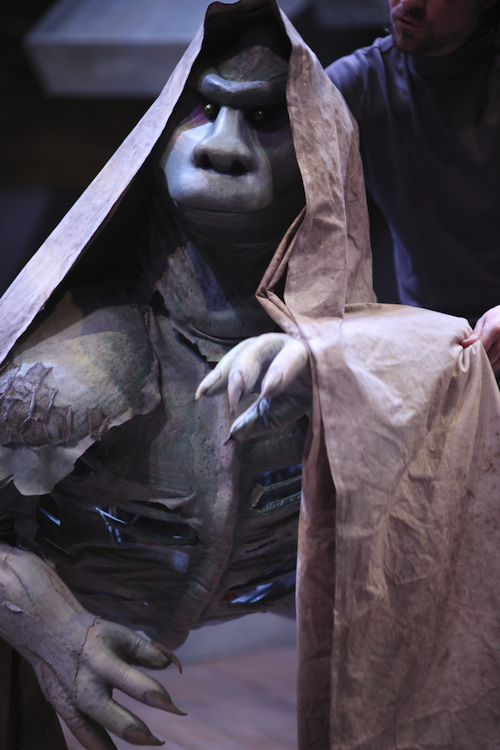The Tempest, Little Angel Theatre/ Royal Shakespeare Company | reviews, news & interviews
The Tempest, Little Angel Theatre/ Royal Shakespeare Company
The Tempest, Little Angel Theatre/ Royal Shakespeare Company
A brief, puppet-led encounter makes adults and kids laugh and blub
Puppetry has come a long way in this country. Once considered the domain of children’s theatre only, you’ll now be hard pushed to find a classical production where puppets are not used in some way. For this sea change we have to thank, amongst others, a couple of Canadian geniuses, Ronnie Birkett and Robert Lepage, and - almost single-handedly carrying the torch for puppetry as a grown-up form to be taken seriously in this country - John and Lyndie Wright, founders of the Little Angel Theatre, Islington. With both celebrating their half-centuries this year, Little Angel and the Royal Shakespeare Company have joined forces once again to produce a magical version of Shakespeare’s final play.
This is an association that reunites the two companies after an unforgettable version of the rarely performed erotic poem Venus and Adonis. It was in 2004 that Greg Doran, then RSC associate director, hit upon the idea of joining forces with the puppet world to tell the story of Venus’s ill-fated lust for the self-obsessed Adonis, with a result that was alchemical, mysterious in its power, and very, very moving.
 This time, on an unseasonally hot and steaming Easter Saturday afternoon yesterday, with an audience of parents and seven-year-olds upwards, The Tempest underwent the Little Angel transformation with a similar success. Cut down to just over an hour and blending actors with the puppets, Little Angel’s artistic director Peter Glanville (he was also responsible apparently for the shadow film in the RSC’s much-admired Christmas show, Matilda), aided by the brilliant puppets designed by Lyndie Wright, rejuvenated what for me has increasingly seemed Shakespeare’s most intractable and unsatisfying play. By all accounts, Declan Donnellan’s recent Russian version of The Tempest is the exception, and that only by breaking with convention.
This time, on an unseasonally hot and steaming Easter Saturday afternoon yesterday, with an audience of parents and seven-year-olds upwards, The Tempest underwent the Little Angel transformation with a similar success. Cut down to just over an hour and blending actors with the puppets, Little Angel’s artistic director Peter Glanville (he was also responsible apparently for the shadow film in the RSC’s much-admired Christmas show, Matilda), aided by the brilliant puppets designed by Lyndie Wright, rejuvenated what for me has increasingly seemed Shakespeare’s most intractable and unsatisfying play. By all accounts, Declan Donnellan’s recent Russian version of The Tempest is the exception, and that only by breaking with convention.
 The Tempest used to be regarded as a pinnacle. Now its laborious comedy with the drunken butler and court Jester and even more interminable scenes of conspiring, treacherous brothers, plus Prospero’s arbitrary cruelty, simply grate. Few productions seem capable of marrying the main narrative with the greater, darker metaphorical and philosophical themes of colonial exploitation, power and control, and the lesson of compassion and forgiveness which entails the surrender of those last two. Not to mention authorial artistic control. Scholars have spent years deliberating on the character of Prospero as a mirror image of Shakespeare laying down his pen, resigning himself to rural obscurity and death.
The Tempest used to be regarded as a pinnacle. Now its laborious comedy with the drunken butler and court Jester and even more interminable scenes of conspiring, treacherous brothers, plus Prospero’s arbitrary cruelty, simply grate. Few productions seem capable of marrying the main narrative with the greater, darker metaphorical and philosophical themes of colonial exploitation, power and control, and the lesson of compassion and forgiveness which entails the surrender of those last two. Not to mention authorial artistic control. Scholars have spent years deliberating on the character of Prospero as a mirror image of Shakespeare laying down his pen, resigning himself to rural obscurity and death.
Going against the grain of such pessimism, Glanville allows his Prospero to be a commanding but benevolent father figure (David Fielder, in fine form, a sense of acceptance of his mortality with grace and humility. He will, you feel, make a good “retirement”). (Pictured right, Fielder with Jonathan Storey as the human Ariel.) Around Fielder, Glanville has collected a wonderfully gifted group of performers who double and treble as singers, musicians, puppeteers and actors manipulating the floating, ethereal Ariel (pictured above left) and my favourite, Caliban.
Part humanoid in face, with a long leather tail, splayed feet and bulbous body, Caliban’s operator endows him with body movements that simultaneously project the character’s inherent beastliness yet inspire sympathy.
 Caliban has been used by Prospero. Like the American Indians, historically soon to be overwhelmed by English, French and Spanish explorers, he has showed Prospero the wonders of his island. In return Prospero steals the island from him and enslaves him. Craftily, however, Shakespeare complicates the equation by adding the civilising if ambiguous tool of speech. Caliban is taught to speak by Miranda, Prospero’s daughter, only for this to bring with it the sexual aspiration to possess her.
Caliban has been used by Prospero. Like the American Indians, historically soon to be overwhelmed by English, French and Spanish explorers, he has showed Prospero the wonders of his island. In return Prospero steals the island from him and enslaves him. Craftily, however, Shakespeare complicates the equation by adding the civilising if ambiguous tool of speech. Caliban is taught to speak by Miranda, Prospero’s daughter, only for this to bring with it the sexual aspiration to possess her.
Granville and his editor, Phil Porter, have done a terrific job of editing. Only once did I detect a restlessness in the young audience – the love scene, as it happens, between Miranda (a lovely Anneika Rose) and Ferdinand, the usurping King of Milan’s son brought to the island in the storm – before attention was swiftly regained with a set of lurid, eye-popping monsters lurking beneath the lids of enormous gleaming food tureens.
If Granville’s sense of the play’s comic potential is sometimes over-larded, still he never loses sight of its fusion of the supernatural and magical. Ben Glasstone’s musical compositions for some of the most haunting songs in the Shakespeare canon – “Come unto these yellow sands”, “Full fathom five thy father lies” and “Where the bee sucks, there suck I” - are delivered with a delicious mixture of humour and sweet Elizabethan purity that evokes a sense of wistfulness and yet completion.
In the end, the puppet gulls which have squawked their displeasure in the storm engineered by Prospero at the beginning, and which has brought his enemies within his grasp, return once more, peacefully, to their surroundings. One even perches amiably on Caliban’s head. As Prospero returns to his native Milan, his thirst for revenge dissolved, his change of heart finds a delightful parallel in this production, in nature. Caliban’s island has been restored to him. So too, the natural order of things.
Beside me, my companion blubbed. And the young audience yelled. In an age of Doctor Who, Harry Potter and any number of digitalised hairy-scarys, these simpler wooden automations still, it seems, have a magical power all their own. More converts, then, to the art of puppet-making, the world of the imagination and, aptly on St George’s and the Bard’s birthday, to Shakespeare himself. A lifetime of illumination awaits them. Lucky them.
- The Tempest continues at the Little Angel Theatre, London N1 to 15 May
- Michael Rosen’s new companion piece, The Magician’s Daughter, for small children over three, runs 28 May-10 July
- The Little Angel Theatre website
The future of Arts Journalism
You can stop theartsdesk.com closing!
We urgently need financing to survive. Our fundraising drive has thus far raised £49,000 but we need to reach £100,000 or we will be forced to close. Please contribute here: https://gofund.me/c3f6033d
And if you can forward this information to anyone who might assist, we’d be grateful.

Subscribe to theartsdesk.com
Thank you for continuing to read our work on theartsdesk.com. For unlimited access to every article in its entirety, including our archive of more than 15,000 pieces, we're asking for £5 per month or £40 per year. We feel it's a very good deal, and hope you do too.
To take a subscription now simply click here.
And if you're looking for that extra gift for a friend or family member, why not treat them to a theartsdesk.com gift subscription?
more Theatre
 Till the Stars Come Down, Theatre Royal Haymarket review - a family hilariously and tragically at war
Beth Steel makes a stirring West End debut with her poignant play for today
Till the Stars Come Down, Theatre Royal Haymarket review - a family hilariously and tragically at war
Beth Steel makes a stirring West End debut with her poignant play for today
 Nye, National Theatre review - Michael Sheen's full-blooded Bevan returns to the Olivier
Revisiting Tim Price's dream-set account of the founder of the health service
Nye, National Theatre review - Michael Sheen's full-blooded Bevan returns to the Olivier
Revisiting Tim Price's dream-set account of the founder of the health service
 Girl From The North Country, Old Vic review - Dylan's songs fail to lift the mood
Fragmented, cliched story rescued by tremendous acting, singing and music
Girl From The North Country, Old Vic review - Dylan's songs fail to lift the mood
Fragmented, cliched story rescued by tremendous acting, singing and music
 The Merry Wives of Windsor, Shakespeare's Globe review - hedonistic fizz for a summer's evening
Emma Pallant and Katherine Pearce are formidable opponents to Falstaff's buffoonery
The Merry Wives of Windsor, Shakespeare's Globe review - hedonistic fizz for a summer's evening
Emma Pallant and Katherine Pearce are formidable opponents to Falstaff's buffoonery
 Run Sister Run, Arcola Theatre review - emphatic emotions, overwrought production
Chloë Moss’s latest play about the different lives of two sisters is deeply felt
Run Sister Run, Arcola Theatre review - emphatic emotions, overwrought production
Chloë Moss’s latest play about the different lives of two sisters is deeply felt
 Intimate Apparel, Donmar Warehouse review - stirring story of Black survival in 1905 New York
An early Lynn Nottage work gets a superb cast and production
Intimate Apparel, Donmar Warehouse review - stirring story of Black survival in 1905 New York
An early Lynn Nottage work gets a superb cast and production
 Hercules, Theatre Royal Drury Lane review - new Disney stage musical is no 'Lion King'
Big West End crowdpleaser lacks punch and poignancy with join-the-dots plotting and cookie-cutter characters
Hercules, Theatre Royal Drury Lane review - new Disney stage musical is no 'Lion King'
Big West End crowdpleaser lacks punch and poignancy with join-the-dots plotting and cookie-cutter characters
 Showmanism, Hampstead Theatre review - lip-synced investigation of words, theatricality and performance
Technically accomplished production with Dickie Beau never settles into a coherent whole
Showmanism, Hampstead Theatre review - lip-synced investigation of words, theatricality and performance
Technically accomplished production with Dickie Beau never settles into a coherent whole
 4.48 Psychosis, Royal Court review - powerful but déjà vu
Sarah Kane’s groundbreaking play gets a nostalgic anniversary reboot
4.48 Psychosis, Royal Court review - powerful but déjà vu
Sarah Kane’s groundbreaking play gets a nostalgic anniversary reboot
 Joyceana around Bloomsday, Dublin review - flawless adaptations of great dramatic writing
Chapters and scenes from 'Ulysses', 'Dubliners' and a children’s story vividly done
Joyceana around Bloomsday, Dublin review - flawless adaptations of great dramatic writing
Chapters and scenes from 'Ulysses', 'Dubliners' and a children’s story vividly done
 Stereophonic, Duke of York's Theatre review - rich slice of creative life delivered by a 1970s rock band
David Adjmi's clever and compelling hit play gets a crack London cast
Stereophonic, Duke of York's Theatre review - rich slice of creative life delivered by a 1970s rock band
David Adjmi's clever and compelling hit play gets a crack London cast

Add comment